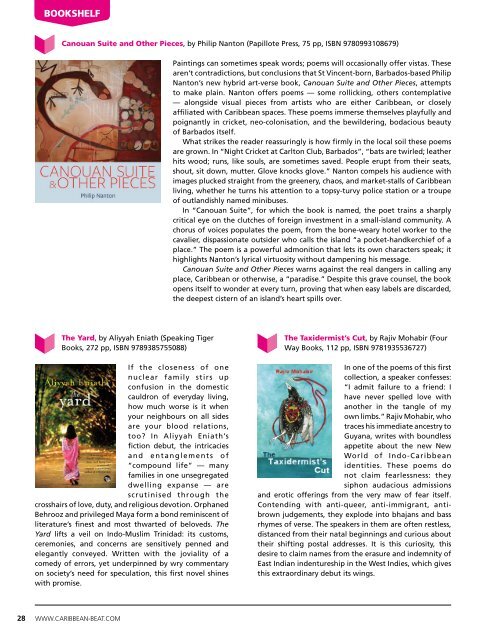Caribbean Beat — 25th Anniversary Edition — March/April 2017 (#144)
A calendar of events; music, film, and book reviews; travel features; people profiles, and much more.
A calendar of events; music, film, and book reviews; travel features; people profiles, and much more.
You also want an ePaper? Increase the reach of your titles
YUMPU automatically turns print PDFs into web optimized ePapers that Google loves.
Bookshelf<br />
Canouan Suite and Other Pieces, by Philip Nanton (Papillote Press, 75 pp, ISBN 9780993108679)<br />
Paintings can sometimes speak words; poems will occasionally offer vistas. These<br />
aren’t contradictions, but conclusions that St Vincent-born, Barbados-based Philip<br />
Nanton’s new hybrid art-verse book, Canouan Suite and Other Pieces, attempts<br />
to make plain. Nanton offers poems <strong>—</strong> some rollicking, others contemplative<br />
<strong>—</strong> alongside visual pieces from artists who are either <strong>Caribbean</strong>, or closely<br />
affiliated with <strong>Caribbean</strong> spaces. These poems immerse themselves playfully and<br />
poignantly in cricket, neo-colonisation, and the bewildering, bodacious beauty<br />
of Barbados itself.<br />
What strikes the reader reassuringly is how firmly in the local soil these poems<br />
are grown. In “Night Cricket at Carlton Club, Barbados”, “bats are twirled; leather<br />
hits wood; runs, like souls, are sometimes saved. People erupt from their seats,<br />
shout, sit down, mutter. Glove knocks glove.” Nanton compels his audience with<br />
images plucked straight from the greenery, chaos, and market-stalls of <strong>Caribbean</strong><br />
living, whether he turns his attention to a topsy-turvy police station or a troupe<br />
of outlandishly named minibuses.<br />
In “Canouan Suite”, for which the book is named, the poet trains a sharply<br />
critical eye on the clutches of foreign investment in a small-island community. A<br />
chorus of voices populates the poem, from the bone-weary hotel worker to the<br />
cavalier, dispassionate outsider who calls the island “a pocket-handkerchief of a<br />
place.” The poem is a powerful admonition that lets its own characters speak; it<br />
highlights Nanton’s lyrical virtuosity without dampening his message.<br />
Canouan Suite and Other Pieces warns against the real dangers in calling any<br />
place, <strong>Caribbean</strong> or otherwise, a “paradise.” Despite this grave counsel, the book<br />
opens itself to wonder at every turn, proving that when easy labels are discarded,<br />
the deepest cistern of an island’s heart spills over.<br />
The Yard, by Aliyyah Eniath (Speaking Tiger<br />
Books, 272 pp, ISBN 9789385755088)<br />
If the closeness of one<br />
nuclear family stirs up<br />
confusion in the domestic<br />
cauldron of everyday living,<br />
how much worse is it when<br />
your neighbours on all sides<br />
are your blood relations,<br />
too? In Aliyyah Eniath’s<br />
fiction debut, the intricacies<br />
and entanglements of<br />
“compound life” <strong>—</strong> many<br />
families in one unsegregated<br />
dwelling expanse <strong>—</strong> are<br />
scrutinised through the<br />
crosshairs of love, duty, and religious devotion. Orphaned<br />
Behrooz and privileged Maya form a bond reminiscent of<br />
literature’s finest and most thwarted of beloveds. The<br />
Yard lifts a veil on Indo-Muslim Trinidad: its customs,<br />
ceremonies, and concerns are sensitively penned and<br />
elegantly conveyed. Written with the joviality of a<br />
comedy of errors, yet underpinned by wry commentary<br />
on society’s need for speculation, this first novel shines<br />
with promise.<br />
The Taxidermist’s Cut, by Rajiv Mohabir (Four<br />
Way Books, 112 pp, ISBN 9781935536727)<br />
In one of the poems of this first<br />
collection, a speaker confesses:<br />
“I admit failure to a friend: I<br />
have never spelled love with<br />
another in the tangle of my<br />
own limbs.” Rajiv Mohabir, who<br />
traces his immediate ancestry to<br />
Guyana, writes with boundless<br />
appetite about the new New<br />
World of Indo-<strong>Caribbean</strong><br />
identities. These poems do<br />
not claim fearlessness: they<br />
siphon audacious admissions<br />
and erotic offerings from the very maw of fear itself.<br />
Contending with anti-queer, anti-immigrant, antibrown<br />
judgements, they explode into bhajans and bass<br />
rhymes of verse. The speakers in them are often restless,<br />
distanced from their natal beginnings and curious about<br />
their shifting postal addresses. It is this curiosity, this<br />
desire to claim names from the erasure and indemnity of<br />
East Indian indentureship in the West Indies, which gives<br />
this extraordinary debut its wings.<br />
28 WWW.CARIBBEAN-BEAT.COM


















